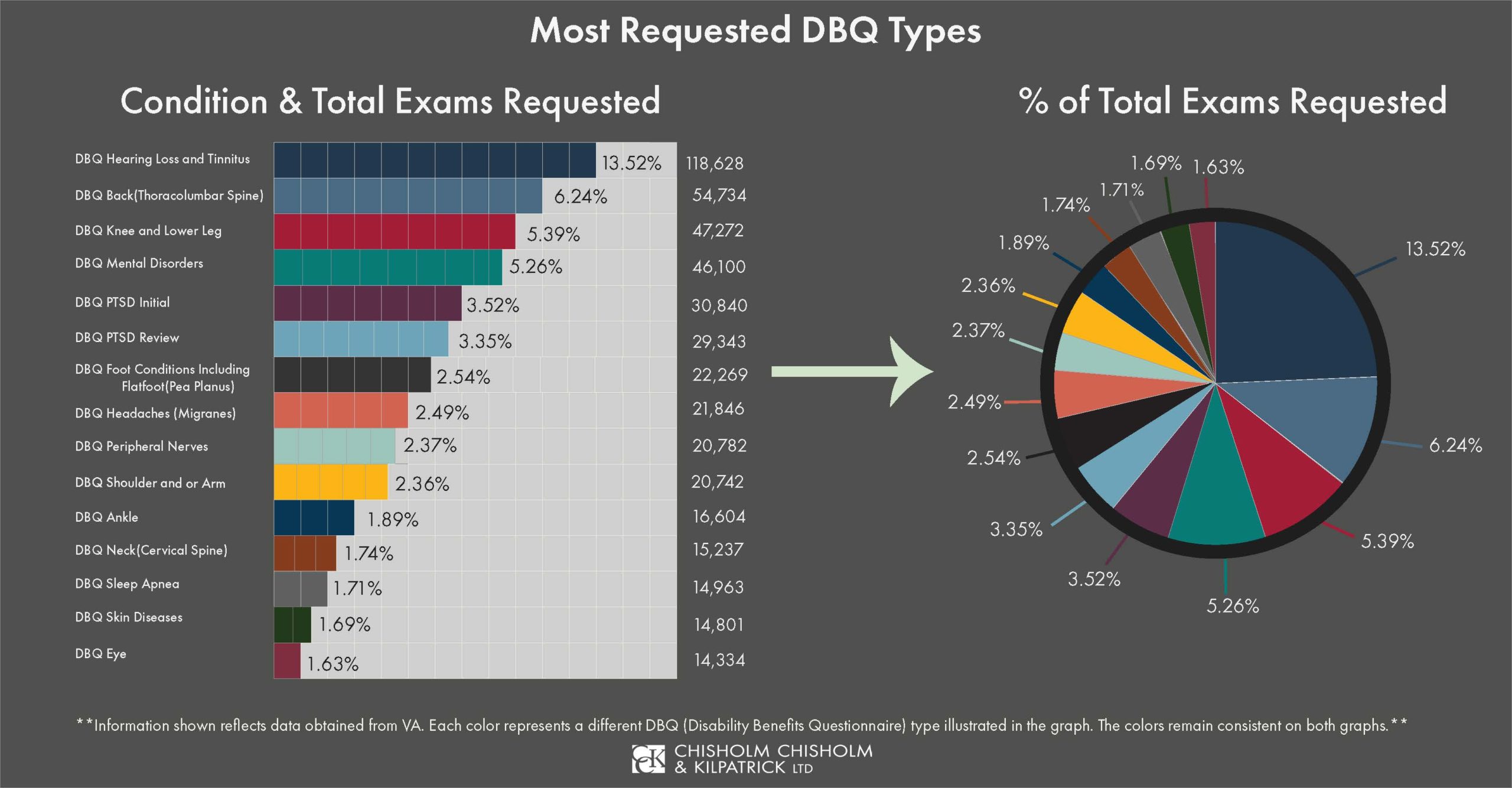Disability Benefits Questionnaires (DBQs): Evidence for Your VA Disability Claim

CCK Law: Our Vital Role in Veterans Law
As part of VA’s Duty to Assist claimants in gathering information helpful for their disability cases, VA often conducts examinations called Compensation and Pension Examinations, also known as C&P Exams. To create a more uniform process, VA developed Disability Benefits Questionnaires (DBQs).
What are DBQs?
Disability Benefits Questionnaires (DBQs) are downloadable forms created for veterans’ use in the evaluation process for VA disability benefits. Specifically, DBQs are intended to speed up the processing of claims for service-connected compensation and give veterans more control over the disability claims process. These forms were created to answer questions about important aspects of disability, including symptoms, severity, possible causes, and relation to other disabilities, as well as to capture information required under the VA Schedule of Disability Ratings found within the Code of Federal Regulations.
How Do DBQs Work?
While veterans were previously able to access these forms, they were not permitted to fill them out themselves. Instead, veterans had the option of visiting a private or VA healthcare provider who could complete the evaluation on their behalf. When having a private healthcare provider complete a DBQ, it is important for veterans to do the following:
- Access the form online through VA’s website and download it (see changes below);
- Have your doctor or healthcare provider complete the form;
- Review their findings and save a copy for your records; and
- Submit the form to VA
The streamlined forms use checkboxes and standardized language so that disability evaluations can be made quickly and correctly. Specifically, healthcare providers will “check a box” next to descriptions that most accurately depict the disability in question.
The use of DBQs also provides veterans with an improved means to submit medical evidence to support their claims. It is important for veterans to be honest about their symptoms to ensure that all documentation accurately reflects the level of impairment caused by the claimed condition(s).
In some cases, a DBQ may even replace a Compensation & Pension (C&P) examination entirely. This is helpful because C&P examinations often add to the long wait times experienced throughout the disability claims process.

What Conditions Are Covered by DBQs?
There are currently more than 70 DBQs covering a range of medical conditions. Some of the DBQs are specific to a single condition (e.g., hypertension, arthritis, prostate cancer), but most forms can be used for several related conditions (e.g., heart conditions, kidney conditions).
If there is no DBQ for your specific condition, VA will use the DBQ that is the most general and all-encompassing for that category. For example, VA is looking for a DBQ that corresponds with your Generalized Anxiety Disorder. There will be three different DBQs under the Psychological category: Eating Disorders, PTSD, and Mental Disorders (other). Here, since Generalized Anxiety Disorder does not have its own DBQ, you would use the DBQ for Mental Disorders as it broadly covers the claimed condition.
Most Requested DBQs
According to data obtained by VA, the most commonly requested DBQs are:
- Hearing Loss and Tinnitus – 13.52% of total exams requested (118,628 forms)
- Back (Thoracolumbar Spine) – 6.24% of total exams requested (54,734 forms)
- Knee and Lower Leg – 5.39% of total exams requested (47,272 forms)
- Mental Disorder – 5.26% of total exams requested (46,100 forms)
Where Can I Find DBQs?
DBQs can be downloaded from the DBQ page on VA’s website.
In addition to this, CCK Law has also committed to hosting these DBQ forms on our site. The reason for this is that, in the past, VA has restricted access to their downloadable DBQ forms. For instance, during the COVID pandemic, VA took down all of the DBQs from their site, preventing veterans from accessing them.
In order to mitigate this risk and ensure that veterans always have access to these DBQ forms, they will remain hosted on the CCK Law website for the foreseeable future (see the bottom of this article for the full list of downloadable forms).
How Can DBQs Help Veterans?
Publicly available DBQs increase efficiency and may help to expedite the claims process.
Direct access to these DBQs also allows veterans to request that their own providers, who were often specialized in a particular relevant area of medicine and familiar with the veterans’ medical history and conditions, complete these forms. This allows veterans to submit DBQs in support of their application for benefits, or even with their application for benefits as part of a fully developed claim.
Submitting these completed DBQs may serve to eliminate months, and often years, many veterans must wait for an exam. They are also particularly useful for veterans living in rural areas or overseas who may experience even longer wait times for exams or greater difficulty traveling the distance required to attend one of VA’s exams.
Why Might a Veteran Not Use a DBQ?
There may be some instances where it is not possible or would not be beneficial for a veteran to use a DBQ. As mentioned, DBQs are not available for every condition that VA rates.
In some rare instances, a private doctor may refuse to fill out a DBQ for a veteran. This means that a veteran will either need to have another doctor who treats their condition fill out a DBQ or not submit a DBQ.
CCK Provides Access to DBQs Online
VA previously removed these forms from public view in the past because VA believed it had sufficiently expanded its own capacity to conduct these examinations.
CCK has and will continue to provide DBQs for Veterans to access.
Find DBQ Forms Here
Access VA DBQ forms provided by CCK here:
- Amputations-DBQ
- Amyotrophic Lateral Sclerosis-DBQ
- Ankle conditions-DBQ
- Artery and Vein Conditions-DBQ
- Arthritis-DBQ
- Back-DBQ
- Bones-DBQ
- Breast-DBQ
- Central Nervous System Diseases-DBQ
- Chronic Fatigue Syndrome-DBQ
- Cold Injury Residuals-DBQ
- Cranial Nerves Diseases-DBQ
- Diabetes Mellitus-DBQ
- Diabetic Peripheral Neuropathy-DBQ
- Ear-DBQ
- Eating Disorders-DBQ
- Elbow and Forearm-DBQ
- Endocrine Diseases-DBQ
- Esophageal-DBQ
- Eye Conditions-DBQ
- Fibromyalgia-DBQ
- Foot-DBQ
- Gallbladder and Pancreas-DBQ
- General Medical – Compensation-DBQ
- General Medical – Pension-DBQ
- Gulf War General Medical (Including Burn Pits)-DBQ
- Gynecological-DBQ
- HIV-DBQ
- Hand and Finger-DBQ
- Headaches-DBQ
- Hearing Loss and Tinnitus-DBQ
- Heart-DBQ
- Hematological and Lymphatic-DBQ
- Hepatitis-DBQ
- Hernias-DBQ
- Hip and Thigh-DBQ
- Hypertension-DBQ
- Infectious Diseases-DBQ
- Initial Traumatic Brain Injury-DBQ
- Intestinal-DBQ
- Intestinal Infectious-DBQ
- Kidney-DBQ
- Knee-DBQ
- Loss of Sense of Smell or Taste-DBQ
- Male Reproductive-DBQ
- Medical Opinion-DBQ
- Mental Disorders-DBQ
- Multiple Sclerosis-DBQ
- Muscles-DBQ
- Narcolepsy-DBQ
- Neck-DBQ
- Nutritional Deficiencies-DBQ
- Oral and Dental-DBQ
- Osteomyelitis-DBQ
- PTSD Initial-DBQ
- PTSD Review-DBQ
- Parkinsons Disease-DBQ
- Peripheral Nerves-DBQ
- Peritoneal Adhesions-DBQ
- Persian Gulf Afghanistan-DBQ
- Prisoner of War-DBQ
- Prostate Cancer-DBQ
- Rectum and Anus-DBQ
- Respiratory Conditions-DBQ
- Review Traumatic Brain Injury-DBQ
- Scars-DBQ
- Seizure Disorders-DBQ
- Separation Health Assessment-DBQ
- Shoulder-DBQ
- Sinusitis Rhinitis-DBQ
- Skin Diseases-DBQ
- Sleep Apnea-DBQ
- Social and Industrial Survey-DBQ
- Stomach-DBQ
- Systemic Lupus Erythematosus-DBQ
- Temporomandibular Disorders-DBQ
- Thyroid and Parathyroid-DBQ
- Tuberculosis-DBQ
- Urinary Tract-DBQ
- Wrist-DBQ
We make no claims as to how helpful these may be in the outcome of a veteran’s case nor are we providing advice; we are simply providing access to this resource to allow veterans the greatest choice and control over the VA claims process.
About the Author
Share this Post

